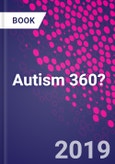Autism 360 uses a hybrid and transdisciplinary methodology to identify mechanisms on how autism is prevented, diagnosed, treated and managed within personal and social constructs around the world. Adopting a lifespan approach, the book discusses lifestyle challenges and emphasizes issues relating to neurodiversity, individuality, best practices, and support of both people on the spectrum and their families. This book will help change population and individual attitudes and behaviors regarding autism. Its ultimate goal is to empower readers to become both agents of change and an integral part of the solution.
Please Note: This is an On Demand product, delivery may take up to 11 working days after payment has been received.
Table of Contents
Section I Prevention 1. A perinatal strategy to prevent autism Undurti N. Das
2. The early development of autism spectrum disorder and its care Colwyn Trevarthen and Jonathan Delafield-Butt
3. Autistic ontologies and the open genome Majia H. Nadesan
4. Underestimated environmental factors contributing to autism spectrum disorders Jean-Baptiste Fini, Michelle Leemans, and Barbara A. Demeneix
5. Dietary interventions to prevent autism spectrum disorder Tatyana El-Kour, Melissa Olive, Natalia Neophytou, and Sandra Pretorius
Section II Assessment and Diagnosis
6. Deriving resting-state fMRI biomarkers for classification of autism spectrum disorder Antonis D. Savva, Aikaterini S. Karampasi, and George K. Matsopoulos
7. Current assessment and diagnostic practices in the United States: what they are missing Nina Newman and Ira Glovinsky
8. A multidisciplinary and parent-useful approach to assessment and diagnosis: creating a road map for professionals, parents, and better outcomes for children Ira Glovinsky and Nina Newman
10. Introducing best practices in treatment modalities using a lifecycle approach Gil Tippy
11. Treatment in autism spectrum disorder: areas of unmet need in the United States Stephanny Freeman and Tanya Paparella
12. Full circle autism care includes family relationships and dynamics Ruby Moye Salazar
13. DIR Model Serena Wieder
14. Sensory processing and meaning making in autism spectrum disorder Isabelle Mueller and Ed Tronick
15. Early intervention for children with autistic spectrum disorders through a system of mobile services in the local community Ivanka Pejic
16. A comparative study of infants and toddlers treated with The Mifne Approach intervention for Autism Spectrum Disorder Hanna A. Alonim, Ido Lieberman, Danny Tayar, Giora Scheingesicht, and Hillel D. Braude
17. Targeting gut microbiota as a possible therapeutic intervention in autism Afaf El-Ansary and Ramesa Shafi Bhat
18. Nutrition and dietary considerations during treatment of autism spectrum disorder Tatyana El-Kour, Melissa Olive, Natalia Neophytou, and Sandra Pretorius
19. Exercise-based interventions for individuals with autism spectrum disorder Natalia Neophytou
20. Adjusting the lens on the spectrum through a developmental, individual-difference, relationshipbased model: a developmental, parent-mediated, play-based intervention Gilbert M. Foley
Section IV Training and Education 21. A comprehensive approach to inclusion: theoretical and clinical implications using the developmental, individual difference, relationship-based DIR Model Alisa Vig
22. New approaches to the development of personalized rehabilitation programs for the children with disabilities, including autism spectrum disorders O.G. Safonicheva and M.A. Ovchinnikova
23. Architecture for autism: built environment performance in accordance to the autism ASPECTSS design index Magda Mostafa








